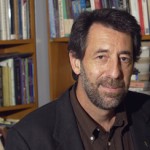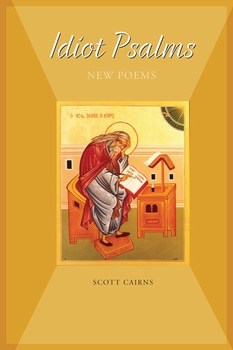I met Scott Cairns once, in 2010, in the Hill Country of Texas. Laity Lodge was hosting a writer’s retreat, and I had signed up for the poetry seminar. Cairns was our seminar teacher. I had previously read two of his books of poetry, which I’d found in the faculty publications section at the University of Missouri at Columbia bookstore.
He taught our seminar like he writes poetry—quiet, reflective, low-key, questioning, gently probing. We sat on a terrace in cool September sunshine, on a bluff above the Frio River. We read poems written by others, and we read poems we had written as overnight assignments. The experience had something of the liturgical about it, with the words, the coolness, the sunshine resembling more of a worship service than a poetry seminar.
Cairns new collection of poems, Idiot Psalms: New Poems, has that same sense of the liturgical. But it’s more what I’d call “the liturgical in real life.” Warm, human, with occasional flashes of dry wit, the poems range from pilgrimages and prayers to theology (Cairns is Greek Orthodox) and even complaints.
The breakfast was adequate, the fast
itself sub-par. We gluttons, having
modified our habits only somewhat
within the looming Lenten dark, failed
quite to shake our thick despair, an air
that clamped the heart, made moot the prayer.
As dim disciples having seen the light,
we supplied to it an unrelenting gloom.
Wipe your chin. I’m dying here
in Omaha, amid the flat, surrounded
by the beefy, land-locked generations,
the river, and the river’s rancid shore.
O what I wouldn’t give for a lifting,
cool salt breeze, a beach, a Labrador.

The collection is framed by 14 “idiot psalms.” They are the psalms, prayers, and requests that come from the human heart. They express doubt and faith, humor, and the desire for mercy, fear and hope. Reading them is an exercise in stillness. They remind me, oddly, of Dietrich Bonhoeffer’s Prison Poems, which I had read shortly before going to that writer’s retreat in Texas. (Either that, or it might be that description of “flat, surrounded” Nebraska in the poem above.)
Some of the psalms are reminiscent of the psalms of David in the Old Testament, especially those believed written as he hid in the wilderness from Saul. Life for many us, and perhaps especially for poets, is a kind of wilderness experience, where we are surrounded by enemies, real and imagined.
Idiot Psalm 4
If I had anything approaching
a new song, surely I would sing.
If I had sufficient vision,
I would see.
If, amid the dim and dissolution
of the January day, new music
might avail to warm what passes
for my heart, surely I would weep.
My enemies are plentiful, and I
surround them, these enemies
camped firmly in my heart, what passes,
lo these dreary ages, for my heart.
O Lord of Hosts, do slay them.
Cairns has been published in numerous publications, including Poetry, The Atlantic Monthly, Paris Review, Image and Spiritus, among others, and his poems are included in several anthologies. He’s received a Guggenheim Fellowship, the Denise Levertov Award, and a Pushcart Prize. An English professor at the University of Missouri, he teaches Modern American Poetry, Poetry in Translation, and several poetry and non-fiction writing courses. He’s been called one of the most skillful religious poets writing today.
I would add that he’s also one the most skillful poets of the human heart writing today.
Image by Christiaan Triebert. Sourced via Flickr. Post by Glynn Young, author of the novels Dancing Priest and A Light Shining, and the just-published Poetry at Work (T. S. Poetry Press).
__________________
Want to brighten your morning coffee?
Subscribe to Every Day Poems and find some beauty in your inbox.
- Poets and Poems: Sandra Marchetti and “Diorama” - April 24, 2025
- Poets and Poems: Christina Cook and “Roaming the Labyrinth” - April 22, 2025
- Longfellow’s “Paul Revere’s Ride”: Creating a National Legend - April 17, 2025


Martha Orlando says
An amazing poet indeed! Thanks for sharing, Glynn!
Maureen Doallas says
Cairns’s poems always strike me as being so grounded and observant; and while he writes on what could be considered big themes, his approach is subtle and thus the impact of the work all the greater.
Megan Willome says
I heard him several years ago, back in 2002, but I didn’t appreciate him. I was just begining to get into poetry then. I think I would like this collection.
Anthony says
I’m a big fan of Dr. Cairns’ work, especially his poetry, which speaks to the mystical and the prosaic, the sacred and profane of belief in a secular world. Thanks for writing this, Glenn.